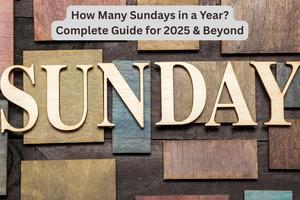How Many Weekends in a Year? Complete Guide with Interactive Calculator

Key Takeaways
Essential insights to remember
Standard Count: Most years have 52 weekends totaling 104 weekend days, but some years feature 105-106 weekend days based on calendar alignment and leap year patterns
2025 Breakdown: 2025 will have exactly 52 weekends (104 weekend days) with five bonus months containing 5 weekends each: March, May, August, November, and December
Maximum Potential: The highest possible weekend count is 106 days, occurring when leap years begin on Saturday (next in 2028), providing exceptional opportunities for extended planning
Planning Strategy: Understanding weekend patterns enables strategic vacation planning, project scheduling, and work-life balance optimization throughout the year
Interactive Tool: Use the built-in calculator to determine exact weekend counts for any year from 1900-2100, accounting for leap years and starting day variations
Introduction
Weekends represent the most treasured time in our weekly cycle—those precious days when work stress melts away and personal time begins. Whether you're planning family vacations, scheduling personal projects, organizing social events, managing work-life balance, or simply curious about maximizing your leisure time, understanding how many weekends occur in a year provides valuable insights for optimizing your personal time and creating meaningful experiences.
The straightforward answer? Most years contain 52 weekends, totaling 104 weekend days. However, some years feature additional weekend days depending on calendar alignment and leap year patterns. This variation can significantly impact your annual planning and leisure strategies.
In this comprehensive guide, we'll explore weekend patterns throughout the years, provide detailed calculations, offer planning strategies, and share an interactive tool to help you calculate weekends for any year. Whether you're a busy professional seeking better work-life balance or a family planner organizing activities, this guide will help you make the most of your weekend time.
How Many Weekends in a Year? The Quick Answer
Standard Year Weekend Count
In a typical calendar year, there are 52 weekends, consisting of 52 Saturdays and 52 Sundays, for a total of 104 weekend days. This calculation is based on the fundamental structure of our Gregorian calendar, which operates on a 52-week cycle.
Weekend Formula: 52 weeks × 2 weekend days per week = 104 weekend days annually
However, the actual number can vary slightly depending on:
- Whether it's a leap year (366 days instead of 365)
- Which day of the week January 1st falls on
- How the extra days align with weekends
When Years Have Extra Weekend Days
Some years provide bonus weekend time with 105 or even 106 weekend days. This occurs when:
Leap Years with Weekend Alignment:
- When a leap year begins on Saturday (resulting in 106 weekend days)
- When a leap year begins on Friday (resulting in 105 weekend days)
Regular Years with Saturday Start:
- When January 1st falls on Saturday in a non-leap year (resulting in 105 weekend days)
📅 Planning Tip: Years with extra weekend days provide excellent opportunities for extended vacation planning, additional family time, or pursuing personal projects that require more weekend availability.
Interactive Weekend Calculator
Use our interactive calculator to determine the exact number of weekends in any year:
How the Calculator Works: This tool calculates weekends based on the 52-week structure of a year and accounts for leap year variations. It determines the starting day of the year and calculates whether there are additional weekend days beyond the standard 104.
Weekends in 2025: Complete Breakdown
Total Weekend Count for 2025
2025 will have 52 weekends with 104 weekend days total. January 1, 2025, falls on a Wednesday, making it a standard year for weekend counting.
2025 Weekend Distribution:
- 52 Saturdays (January 4 through December 27)
- 52 Sundays (January 5 through December 28)
- Total: 104 weekend days
Complete List of 2025 Weekends by Month
January 2025 Weekends (4 weekends):
- Weekend 1: Saturday, January 4 & Sunday, January 5
- Weekend 2: Saturday, January 11 & Sunday, January 12
- Weekend 3: Saturday, January 18 & Sunday, January 19
- Weekend 4: Saturday, January 25 & Sunday, January 26
February 2025 Weekends (4 weekends):
- Weekend 5: Saturday, February 1 & Sunday, February 2
- Weekend 6: Saturday, February 8 & Sunday, February 9
- Weekend 7: Saturday, February 15 & Sunday, February 16
- Weekend 8: Saturday, February 22 & Sunday, February 23
March 2025 Weekends (5 weekends):
- Weekend 9: Saturday, March 1 & Sunday, March 2
- Weekend 10: Saturday, March 8 & Sunday, March 9
- Weekend 11: Saturday, March 15 & Sunday, March 16
- Weekend 12: Saturday, March 22 & Sunday, March 23
- Weekend 13: Saturday, March 29 & Sunday, March 30
April 2025 Weekends (4 weekends):
- Weekend 14: Saturday, April 5 & Sunday, April 6
- Weekend 15: Saturday, April 12 & Sunday, April 13
- Weekend 16: Saturday, April 19 & Sunday, April 20
- Weekend 17: Saturday, April 26 & Sunday, April 27
May 2025 Weekends (5 weekends):
- Weekend 18: Saturday, May 3 & Sunday, May 4
- Weekend 19: Saturday, May 10 & Sunday, May 11
- Weekend 20: Saturday, May 17 & Sunday, May 18
- Weekend 21: Saturday, May 24 & Sunday, May 25
- Weekend 22: Saturday, May 31 & Sunday, June 1
June 2025 Weekends (4 weekends):
- Weekend 23: Saturday, June 7 & Sunday, June 8
- Weekend 24: Saturday, June 14 & Sunday, June 15
- Weekend 25: Saturday, June 21 & Sunday, June 22
- Weekend 26: Saturday, June 28 & Sunday, June 29
July 2025 Weekends (4 weekends):
- Weekend 27: Saturday, July 5 & Sunday, July 6
- Weekend 28: Saturday, July 12 & Sunday, July 13
- Weekend 29: Saturday, July 19 & Sunday, July 20
- Weekend 30: Saturday, July 26 & Sunday, July 27
August 2025 Weekends (5 weekends):
- Weekend 31: Saturday, August 2 & Sunday, August 3
- Weekend 32: Saturday, August 9 & Sunday, August 10
- Weekend 33: Saturday, August 16 & Sunday, August 17
- Weekend 34: Saturday, August 23 & Sunday, August 24
- Weekend 35: Saturday, August 30 & Sunday, August 31
September 2025 Weekends (4 weekends):
- Weekend 36: Saturday, September 6 & Sunday, September 7
- Weekend 37: Saturday, September 13 & Sunday, September 14
- Weekend 38: Saturday, September 20 & Sunday, September 21
- Weekend 39: Saturday, September 27 & Sunday, September 28
October 2025 Weekends (4 weekends):
- Weekend 40: Saturday, October 4 & Sunday, October 5
- Weekend 41: Saturday, October 11 & Sunday, October 12
- Weekend 42: Saturday, October 18 & Sunday, October 19
- Weekend 43: Saturday, October 25 & Sunday, October 26
November 2025 Weekends (5 weekends):
- Weekend 44: Saturday, November 1 & Sunday, November 2
- Weekend 45: Saturday, November 8 & Sunday, November 9
- Weekend 46: Saturday, November 15 & Sunday, November 16
- Weekend 47: Saturday, November 22 & Sunday, November 23
- Weekend 48: Saturday, November 29 & Sunday, November 30
December 2025 Weekends (4 weekends):
- Weekend 49: Saturday, December 6 & Sunday, December 7
- Weekend 50: Saturday, December 13 & Sunday, December 14
- Weekend 51: Saturday, December 20 & Sunday, December 21
- Weekend 52: Saturday, December 27 & Sunday, December 28
2025 Five-Weekend Months
Five months in 2025 will have 5 complete weekends: March, May, August, November, and December. These months provide excellent opportunities for:
- Extended weekend projects and home improvements
- Multi-day family gatherings or reunions
- Weekend getaways and mini-vacations
- Seasonal activities and outdoor adventures
🌟 Planning Opportunity: The five-weekend months in 2025 fall strategically throughout the year, offering regular opportunities for extended leisure time and special activities.
Historical Weekend Patterns: Last 20 Years
Understanding weekend patterns over the past two decades reveals fascinating insights into our calendar system and helps with long-term planning:
Weekend Count by Year (2005-2024):
Pattern Analysis: Over this 20-year period, most years had the standard 104 weekend days, with 2011, 2012, 2016, and 2022 providing bonus weekend days. This pattern helps predict future weekend-rich years for strategic planning.
Future Weekend Projections: 2025-2044
Planning for the future? Here's a comprehensive projection of weekend patterns for the next 20 years:
Key Future Highlights:
- 2028: Maximum weekend days (106) - perfect for sabbaticals or major projects
- 2033 & 2039: Bonus weekend years (105 days each)
- 2044: Another maximum weekend year (106 days)
💡 Long-term Planning Insight: If you're planning major life events, sabbaticals, or extended projects, years with 105-106 weekend days provide exceptional opportunities for personal time and family activities.
Weekend Planning Strategies and Applications
Work-Life Balance Optimization
Understanding weekend patterns enables strategic work-life balance planning:
Annual Leave Planning:
- Coordinate vacation days with five-weekend months for extended breaks
- Plan major projects during months with standard weekends to preserve bonus time
- Use weekend-rich years for career transitions or personal development
Family Time Management:
- Schedule annual family reunions during five-weekend months
- Plan children's activities around consistent weekend availability
- Coordinate extended family visits during bonus weekend periods
Business and Event Planning
Weekend knowledge provides competitive advantages for businesses and event planners:
Event Scheduling:
- Book venues early for five-weekend months (higher demand)
- Plan annual conferences during standard weekend months
- Schedule recurring events to maximize weekend availability
Retail and Service Industries:
- Prepare for increased weekend business during bonus months
- Plan inventory and staffing around weekend patterns
- Develop seasonal promotions aligned with weekend frequency
Personal Project Planning
Maximize productivity by aligning projects with weekend availability:
Home Improvement Projects:
- Schedule major renovations during five-weekend months
- Plan garden and outdoor projects for spring's bonus weekends
- Coordinate DIY projects with extended weekend periods
Learning and Development:
- Enroll in weekend courses during standard months
- Plan intensive learning projects for bonus weekend years
- Schedule certification programs around optimal weekend patterns
Weekend Mathematics: The Science Behind the Count
Basic Weekend Calculation Formula
The fundamental weekend calculation follows this mathematical principle:
Base Weekends = 52 weeks × 2 days = 104 weekend days Additional Days = Total Year Days - (52 × 7) Weekend Bonus = Additional Days that fall on Saturday or Sunday
Leap Year Weekend Logic
Leap years introduce complexity to weekend calculations:
Leap Year Rules:
- Years divisible by 4 are leap years
- Years divisible by 100 are NOT leap years
- Years divisible by 400 ARE leap years
Weekend Impact:
- Leap years add 1 extra day (February 29)
- If the extra day falls on Saturday or Sunday, total weekend days increase
- Maximum possible weekend days in any year: 106 (leap year starting Saturday)
Calendar Cycle Patterns
The Gregorian calendar follows a 400-year cycle with predictable patterns:
28-Year Weekend Subcycle: Every 28 years, weekend patterns repeat exactly, including leap year alignments and starting days. This allows for precise long-term weekend forecasting.
Average Weekend Count: Over a complete 400-year Gregorian cycle, the average number of weekend days per year is approximately 104.25, accounting for all leap year variations and starting day combinations.
Maximizing Your Weekend Time
Weekend Quality vs. Quantity
While knowing the number of weekends helps with planning, maximizing weekend quality matters more than quantity:
High-Impact Weekend Activities:
- Quality family time and relationship building
- Personal development and skill acquisition
- Physical fitness and outdoor activities
- Creative pursuits and hobby development
- Rest and mental health maintenance
Weekend Energy Management:
- Saturday: High energy for active pursuits and projects
- Sunday: Moderate energy for planning and preparation
- Balance productivity with relaxation for sustainable enjoyment
Seasonal Weekend Optimization
Different seasons offer unique weekend opportunities:
Spring Weekends (March-May):
- Outdoor activities and nature exploration
- Home improvement and gardening projects
- Spring cleaning and organization
- Festival and outdoor event attendance
Summer Weekends (June-August):
- Vacation travel and extended getaways
- Outdoor sports and recreation
- Family gatherings and barbecues
- Beach and water activities
Fall Weekends (September-November):
- Harvest activities and seasonal celebrations
- Indoor project completion before winter
- Educational pursuits and skill development
- Preparation for holiday seasons
Winter Weekends (December-February):
- Indoor hobbies and creative projects
- Holiday celebrations and family traditions
- Planning and goal setting for the new year
- Cozy activities and relationship building
International Weekend Variations
Global Weekend Patterns
Weekend definitions vary globally, affecting annual weekend counts:
Western Pattern (Saturday-Sunday):
- Most common globally
- 104-106 weekend days annually
- Used in North America, Europe, Australia
Middle Eastern Pattern (Friday-Saturday):
- Common in Islamic countries
- Different calculation based on Friday inclusion
- 104-106 weekend days with different alignment
Alternative Patterns:
- Some countries observe only one weekend day
- Certain industries maintain different weekend schedules
- Remote work has created flexible weekend definitions
Cultural Weekend Significance
Weekend cultural importance affects planning and utilization:
Family-Centered Cultures:
- Weekends prioritize extended family gatherings
- Multi-generational activities and traditions
- Community and religious observances
Individual-Focused Cultures:
- Personal time and self-care emphasis
- Individual hobby and interest pursuit
- Flexible social and recreational activities
Weekend Planning Tools and Resources
Digital Planning Solutions
Modern technology offers sophisticated weekend planning tools:
Calendar Applications:
- Google Calendar for weekend event coordination
- Apple Calendar for family schedule integration
- Microsoft Outlook for work-life balance planning
Specialized Apps:
- Weekend trip planning applications
- Family activity coordination tools
- Project management for weekend tasks
Traditional Planning Methods
Time-tested planning approaches remain effective:
Physical Planners:
- Annual calendars with weekend highlighting
- Monthly planning sheets for weekend goals
- Weekly schedules with weekend priority sections
Family Planning Systems:
- Kitchen calendar coordination
- Weekend activity rotation charts
- Seasonal tradition planning guides
Related Calendar Information
Understanding weekend patterns connects to broader calendar knowledge and time management strategies. If you're interested in exploring patterns for individual days of the week, you might find these resources helpful:
For comprehensive information about specific weekdays, consider exploring:
- How many Mondays in a year - Essential for understanding workweek beginnings and Monday motivation
- How many Tuesdays in a year - Perfect for productivity planning and peak performance scheduling
- How many Wednesdays in a year - Ideal for mid-week planning and hump day motivation
- How many Thursdays in a year - Great for holiday planning and week-end preparation
- How many Fridays in a year - Perfect for TGIF celebrations and weekend preparation
- How many Saturdays in a year - Essential for weekend planning and leisure activities
- How many Sundays in a year - Excellent for family planning and weekend activities
These guides provide similar detailed analysis for each day of the week, helping you understand the complete picture of annual time management and strategic planning opportunities.
Conclusion
Understanding how many weekends occur in a year—typically 52 weekends totaling 104 weekend days, with occasional bonus days in certain years—provides a foundation for strategic life planning, work-life balance optimization, and meaningful leisure time utilization.
The year 2025 offers 52 standard weekends with five bonus weekend months, creating excellent opportunities for extended projects, family activities, and personal development. Looking ahead, years like 2028 and 2044 will provide maximum weekend days (106), offering exceptional opportunities for sabbaticals, major life changes, or intensive personal projects.
Weekend planning extends beyond simple counting to encompass quality time management, seasonal optimization, cultural considerations, and personal goal achievement. Whether you're coordinating family activities, planning career transitions, managing business operations, or simply seeking better work-life balance, understanding weekend patterns empowers more informed decision-making and enhanced life satisfaction.
As you plan your upcoming weekends, remember that these 104+ annual days represent approximately 28% of your year—a significant portion of life dedicated to rest, relationships, recreation, and personal growth. Making the most of this time through strategic planning and intentional choices can dramatically improve your overall quality of life and long-term happiness.
Use the insights and tools provided in this guide to transform your weekend planning from reactive to proactive, ensuring that each weekend contributes meaningfully to your personal and family goals while maintaining the essential balance between productivity and relaxation that makes weekends so valuable.





